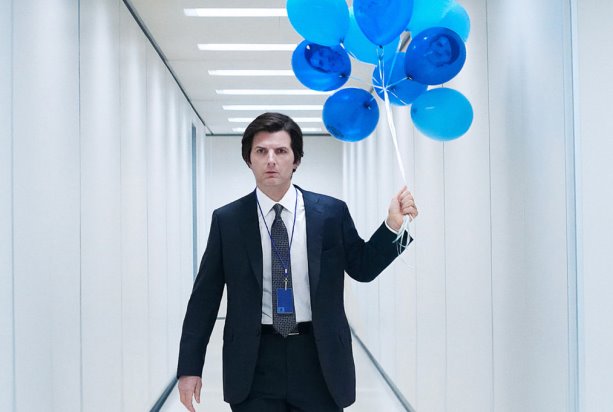With Severance emerging as the frontrunner, The Studio making a forceful entrance, The Pitt catching critics off guard, and The White Lotus continuing its slow but steady colonization of television’s most prestigious categories, the 77th Primetime Emmy Awards nominations mark a turning point for the post-pandemic TV landscape. What was once a fragmented and experimental moment has now solidified into a new era—one characterized by complexity, oversaturation, and an increasing fascination with self-reflection and meta-narratives.
Nearly three years after its debut, Severance—the hauntingly precise, emotionally intricate workplace thriller created by Dan Erickson and directed by Ben Stiller—returns with a second season that deepens its aesthetic ambition and thematic unease. With 27 nominations, it confirms its status not just as a critical darling, but as one of the most intellectually daring and formally accomplished series of the decade.

At its core lies a stark meditation on the fragmentation of labor and identity, on the alienation between body and self in a world governed by surveillance and control. That achievement belongs not only to its taut writing and direction, but to a cast operating in near-perfect harmony: Adam Scott, Britt Lower, John Turturro, Patricia Arquette, Zach Cherry, and Tramell Tillman all contribute to a drama that feels unsettlingly close to our own reality.
Second only in total nominations is The Studio, Apple TV+’s acerbic, sharply crafted satire of post-MeToo Hollywood. With 23 nods—including acting nominations for Seth Rogen, Kathryn Hahn, Catherine O’Hara, Ike Barinholtz, and, in a surprising first, Martin Scorsese—it has established itself as both crowd-pleaser and critical success.
If The Studio was the anticipated success, The Pitt is the year’s true revelation. A dystopian medical drama set in an overburdened emergency room in the wake of America’s healthcare collapse, the series channels both urgency and despair with startling realism. Noah Wyle—returning to familiar territory after his iconic turn in ER—delivers a career-redefining performance that earned him a nomination for Lead Actor in a Drama. With a total of 13 nominations, including two for direction and several for writing, The Pitt has vaulted into the Emmy conversation on the strength of its gritty storytelling and uncompromising social critique, offering not just entertainment but indictment.
The comedy field, long dominated by returning heavyweights, saw new players step into the spotlight. The Bear remains a formidable presence, but it shares space this year with Abbott Elementary, Only Murders in the Building, Hacks, Shrinking, What We Do in the Shadows, and Nobody Wants This—a fresh, darkly funny show starring Kristen Bell and Adam Brody that sidesteps the conventions of the traditional sitcom. Yet once again, it is The Studio that leads the field, with multiple acting nods and a nomination for Best Directing in a Comedy, thanks to The Oner, an ambitious, single-take episode that blends technical virtuosity with razor-sharp satire.

In the limited series categories, The Penguin (HBO Max) leads with 24 nominations, anchoring a strong slate that includes Adolescence, Black Mirror, Dying for Sex, and Monsters: The Lyle and Erik Menendez Story. Colin Farrell and Cristin Milioti bring unexpected pathos to Gotham’s criminal underworld in The Penguin, a brooding noir that finds new ground in a well-trodden mythology. Meanwhile, Adolescence—a searing British drama created by Jack Thorne and directed by Philip Barantini—has earned critical acclaim for its unflinching, poetic depiction of coming-of-age in an era of precarity and social unrest.
There were also symbolic firsts: Ron Howard received his first-ever Emmy nomination for acting, thanks to a self-aware and unexpectedly funny turn in The Studio, where he shares screen time with fellow nominees Bryan Cranston, Anthony Mackie, Dave Franco, and Martin Scorsese. Harrison Ford, too, earned his first acting nod for his role in Shrinking, proving that age is no longer a barrier to Emmy recognition—a fact also underscored by Kathy Bates, nominated for Matlock.
Yet the list is not without conspicuous absences. Succession, despite closing its acclaimed run in 2024, missed the eligibility window entirely. More puzzling is the total shutout of Shōgun, last year’s Emmy winner and still enjoying critical reverence in reruns. Similarly, Bridget Jones: Mad About the Boy—a commercial hit—received no recognition, and House of the Dragon failed to land a drama series nomination despite the momentum of its second season. The Morning Show, once a perennial Emmy favorite, was also completely overlooked.

Among the record-breaking performances, The White Lotus stands out for its near-total domination of the supporting categories. With nominations for Walton Goggins, Sam Rockwell, Jason Isaacs, Natasha Rothwell, Carrie Coon, Parker Posey, and Aimee Lou Wood, the HBO anthology has become less a series than a recurring institution—closer in spirit to Saturday Night Live than to any conventional drama. As it enters its third season, The White Lotus now reads as an ongoing excavation of Western narcissism, dressed in luxury robes and performed poolside.
The 77th Emmy Awards will be broadcast live on CBS and Paramount+ on Sunday, September 14, hosted by comedian Nate Bargatze. But beyond the trophies and speeches, the real reward may go to those few shows that manage to break the self-referential spell of modern television—or at the very least, those who can cast it more elegantly than the rest.










